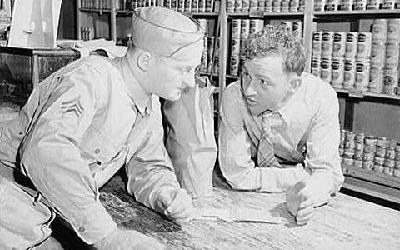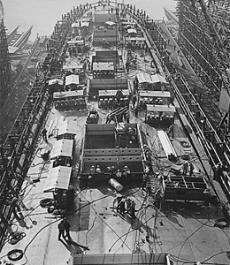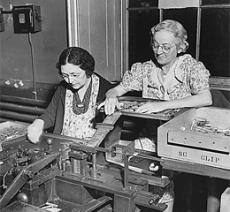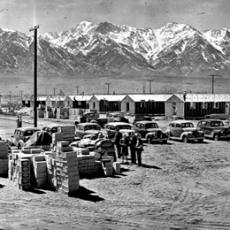
STEVE EMBER: Welcome to THE MAKING OF A NATION – American history in VOA Special English. I'm Steve Ember.
(MUSIC)
The United States entered the Second World War in December of 1941. Europe had already been at war since 1939. But the United States did not enter World War Two until Japanese forces attacked the American naval base at Pearl Harbor, Hawaii.
(SOUND)
The attack was a surprise. But American military and political leaders had believed that the United States, sooner or later, would be pulled into the fighting. And they began to prepare for war.
(MUSIC)
President Franklin Roosevelt had been assistant secretary of the Navy under President Woodrow Wilson during World War One. He remembered how American troops were not ready for that war. Now that he was president, Roosevelt wanted to be sure that the United States would be ready when it had to fight. Throughout 1941, Roosevelt urged American industries to produce more weapons and other military supplies. He established new government agencies to work with industry to increase arms production.

Some business leaders resisted Roosevelt's efforts. They felt there was no need to produce more arms while the United States was still at peace. But many others cooperated. And by the time Japan attacked Pearl Harbor, the American economy was producing millions of guns and other weapons.
Still, this was not enough to fight a war. After the Japanese attack, Roosevelt increased his demands on American industry. He called for 60,000 warplanes, 45,000 tanks and 20,000 anti-aircraft guns. And he wanted all these within one year.
A month after the Pearl Harbor raid, Roosevelt organized a special committee to direct military production. He created another group to help companies find men and women for defense work. And he established a new office where the nation's best scientists and engineers could work together to design new weapons.
These new government organizations faced several problems. Sometimes factories produced too much of one product and not enough of another. Sometimes tools broke. And some business owners refused to accept government orders.
But the weapons were produced, and American troops soon had the guns and supplies they needed.
(MUSIC)

The federal government had to quickly expand its own workforce to meet war needs. Federal spending increased from six billion dollars in 1940 to 89 billion in 1944. That was 15 times as much spending in just five years.
Roosevelt had to take strong steps to get the money for all this spending. He put limits on wages. He increased income taxes to as much as 94 percent on portions of incomes over 200,000 dollars. And he asked the American people to lend money to the federal government. The people answered by purchasing almost 100 billion dollars in war bonds.
The great increase in public spending raised the threat of high inflation. Roosevelt created a special office with the power to control prices. Many Americans agreed with the idea of price controls. But every business wanted somebody else's prices controlled, not their own.
Federal officials had to work hard to keep prices and supplies under control. They restricted how much meat, fuel and other goods people could buy.
The price control program generally worked. Its success kept the American economy strong to support the troops fighting in Europe and Asia.
One reason these strong economic steps worked was because most of the American people fully supported the war effort.
(MUSIC: "Rosie the Riveter")

STEVE EMBER: You can look at photographs of people from those times and see in their faces how strongly they felt.
In one picture from the state of North Carolina, a group of men are standing in front of old rubber tires. They are planning to give the tires to the Army to be fixed and used for military vehicles.
Another photo shows a woman visiting a hospital. She is singing to a soldier to lift his spirits.
Still another photo shows a man who owns a small food store. He is placing signs on meat and cans of food to tell people how much they are allowed to buy.
You can also get an idea about the feelings of the times by the names of some of the popular songs during World War Two.
(MUSIC: "Praise the Lord and Pass the Ammunition")
STEVE EMBER: In addition to "Rosie the Riveter," there were songs like "Praise the Lord and Pass the Ammunition." One of the most hopeful songs was this one, recorded by Britain's Vera Lynn.
(MUSIC: "When the Lights Go on Again All Over the World")
STEVE EMBER: Not all Americans supported the war. A small number refused to fight because of religious or moral beliefs. They were known as conscientious objectors. And some Americans supported Adolf Hitler and other fascists. But almost everyone else wanted to win the war quickly and return to a normal life.
(MUSIC)
Many Japanese-Americans served with honor in the United States armed forces. But many Americans were suspicious of anyone whose family had come from Japan. They refused to trust even Japanese-American families who had lived in the United States for more than a century.

Many banks refused to lend money to Japanese-Americans. Many stores would not sell to them.
The federal government relocated thousands of Japanese-Americans in California and other states into internment camps. They were released only after the war ended. It was many years before the government officially apologized for mistreating Japanese-Americans.
(MUSIC)
STEVE EMBER: But World War Two did lead to progress for another group that was often the target of discrimination: black Americans. Black leaders spoke out. They said it was unfair to fight a war for freedom in Europe while black Americans did not have all the same freedoms as white citizens.
A. PHILIP RANDOLPH: "Negros want the same things that white citizens possess – all their rights, and no force under the sun can stem and block and stop this civil rights revolution which is now underway."
STEVE EMBER: In 1941, a leader in the black community, A. Philip Randolph, threatened to lead a giant march on Washington for civil rights for blacks. President Roosevelt reacted by issuing an order that made it a crime to deny blacks a chance for jobs in defense industries. He also ordered the armed forces to change some of their rules that discriminated against black service members.
Blacks made progress in the military and defense industries. But most other industries still refused to give them an equal chance. Major progress on civil rights would not come until the 1950s and 1960s.
(MUSIC)
Life was busy during the war years. There were many changes in the economy, business, music, race relations and other areas. But in many ways, life continued as it always does.
Americans did what they could during the hard years of World War Two to keep life on the home front as normal as possible. But almost everyone understood that the first job was to support the troops overseas and win the war.
This strength of purpose at home gave American soldiers the support they needed. And it also helped President Roosevelt as he negotiated with other world leaders. Diplomacy and foreign relations became much more complex during the war. That will be our story next week.
Our program was written by David Jarmul. You can find our series online with transcripts, MP3s, podcasts and pictures at voaspecialenglish.com. You can also follow us on Facebook and Twitter at VOA Learning English. I'm Steve Ember, inviting you to join us again next week for THE MAKING OF A NATION -- American history in VOA Special English.
conscientious objector: a person who refuses to serve in the armed forces for moral reasons 出于道義原因而拒服兵役者
American history: the war in the Pacific
American history: World War Two continues with the D-Day invasion in Normandy
American history: German forces defeated in Russia and Britain
American history: US declares war on Japan, Germany and Italy
(來源:VOA 編輯:崔旭燕)
